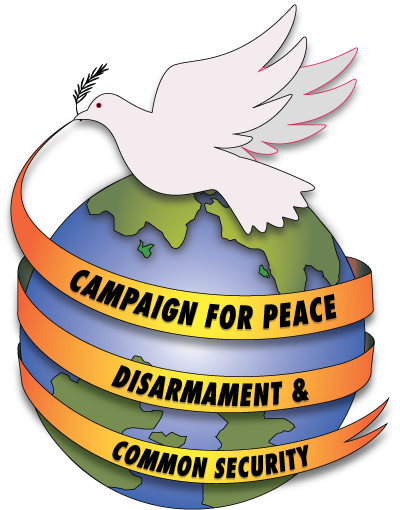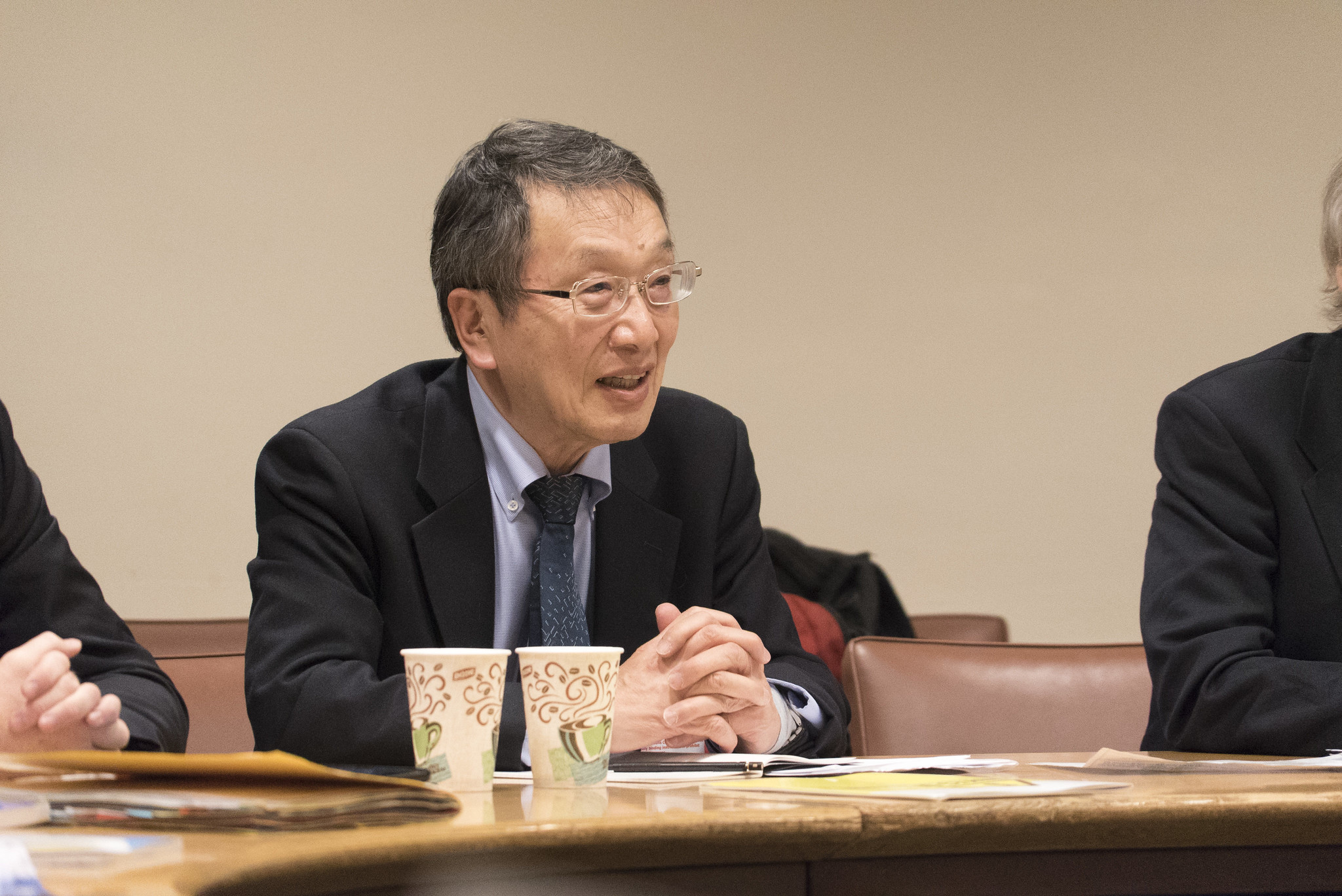Hiroshi Taka, long the General Secretary of Gensuikyo, the Japan Council against A- & H-Bombs was awarded the International Peace Bureau’s Sean MacBride Peace Prize. True to his modest character and profound commitments to nuclear weapons abolition, Taka’s speech reviewed 40 years of some of the world’s most important nuclear disarmament initiatives and the importance of preventing nuclear war over Ukraine and the urgent need to work for nuclear weapons abolition. You will find it inspiring.
Sean MacBride Peace Prize Acceptance Speech
Oct. 18, 2022, Ghent, Belgium
Time to Take Full Steps to a World without Nuclear Weapons
Hiroshi TAKA
Japan Council against Atomic and Hydrogen Bombs
Dear IPB leaders and board members,
Dear friends attending here in person and online,
I want to thank you for awarding me this honorable prize named after our most respectable late Sean MacBride, and renew our determination with all friends who share with me this honor to make full steps towards a world free of nuclear weapons.
The ongoing indiscriminate Russian attacks on citizens and cities in Ukraine and growing fear of possible use of nuclear weapons are showing us that the reinforcement and modernization of nuclear weapons, massive build-up of military arsenals, expansion of military alliances prompted by nuclear powers’ leaders and their allies in the name of “security” or “strategic balance” are wrong, and that these are the very causes which are endangering the world and claiming human lives.
The answer was already given 77 years ago when the world adopted the UN Charter, and when the UN General Assembly adopted the resolution No.1 in the following year, pledging to eliminate atomic weapons from national arsenals. Why do they not endeavor to resolve complex world problems and conflicts by peaceful means? Why do they give no heed to the voice of Hibakusha, the people who narrowly survived Hiroshima and Nagasaki? Why do they not abide by these grand rules of world peace?
Herein lies the reason why we say: Now is the time for the anti-nuclear peace
movements working at grassroots and their network IPB to play their proper role to build
massive public opinion and their actions.
My memory of Sean MacBride
Though it was only in a short span of few years in the 1980s, I often met with Sean MacBride in the regular meetings of the IPB and the Special NGO Committee for Disarmament in Geneva, when he was the president of both of them. It still remains vividly in my memory.
In February 1985, following the years when massive anti-nuclear demonstrations continued everywhere in the world, we invited peace organizations from11 countries to Tokyo to hold consultations on issuing an appeal for a global signature campaign. The Appeal was entitled the “Appeal from Hiroshima and Nagasaki – for a Total Ban and Elimination of Nuclear Weapons.” It was an ambitious plan to build consensus in support of a total ban on nuclear weapons at grassroots of the world, including the nuclear powers, to overcome the “strategic balance” argument that still dominated their policies. The Soviet Peace Committee hesitated to come, but altogether 12 organizations, including ours, attended and agreed on the text. The Appeal declared the use of nuclear weapons as immoral, illegal and a crime against the human community, and called for a total ban and elimination of nuclear weapons as the most urgent and vital task for the very survival of the whole of humanity. It was an epoch-making appeal.
No sooner was the text agreed than my boss, Koichi Akamatsu, and I left for Geneva to attend a meeting of the Special NGO Committee for Disarmament and asked for support from its members. Many friends expressed their support but there were also opinions that still stood on the “strategic balance” thinking and unable to immediately support the abolition. Notwithstanding, Sean MacBride, then chairing the meeting, proposed without a minute of hesitation to adopt it right away, saying “this is a simple and clear message.” The proposal was not adopted there after all, and I asked committee members to bring it back to their organizations and examine it for endorsement. After three years, the “Appeal from Hiroshima and Nagasaki” was taken up by the NGO Forum held in Geneva in April 1988, about one month before the third UN Special Session on Disarmament, and a recommendation was adopted by it to call on the SSD-III to set “a total ban and the elimination of nuclear weapons” in its agenda as “the most urgent and vital task”. The 2nd “Peace Wave”, the international joint action at grassroots that encircle the globe along with the earth’s self-rotation for the one common objective of the “elimination of nuclear weapons” took place in parallel with the SSD-III. Actions were organized in more than 70 countries, and even in the Soviet Union, the peace organization collected signatures nationwide in support of the Appeal and launched a ship in Black Sea to throw away nuclear missiles (not real ones, of course).
Sean died on Jan. 15, 1988, but his determined action remains sharp in my heart as an example of the attitude to take in facing an existential problem for the humankind.
Abolition of nuclear weapons continues to grow in the world
How many more seconds will the hands of the Doomsday Clock move closer to midnight in next January? Or will they have already reached Zero by then? The crisis is not only in Ukraine. On Oct. 11, one day before my departure for Ghent, North Korea announced that the launching of seven ballistic missiles was a part of the exercise of its tactical nuclear operation unit and a stern warning against USS Ronald Reagan and its carrier strike group (CSG) deployed at and around Japan.
Anxieties spread. In the heightened fear, the tendency to rely on “nuclear umbrella”, or military alliance, or for the build-up of already too huge military arsenals is growing. Yet, if we lose sight of the globally rising prospect for a nuclear-free, peaceful world, it will be a serious error.
The answer is clearly seen in the field of nuclear disarmament. Amid the said crisis, the First Meeting of States Parties to the TPNW was attended not only by the states parties but also by Norway, Germany, Netherland and Australia, and the number of the states parties and those who newly signed the treaty increased to 68 and 91 respectively. Even in the countries whose governments have shown hostility to the treaty, such as Japan, the support of the treaty by the majority of the people remains evident.
The result of the NPT Review Conference in August was more eloquent. The media reported it was a failure because no agreement was reached on the outcome document. Yet many people who followed the conference deliberations reached a quite different conclusion. Most speakers who took the floor in the closing session on Aug. 26 eloquently made clear in their one or two-minute speeches where the true problem in the conference lied. All of them pointed out that it was because the P5, including Russia, refused to implement Article 6 of the treaty and all agreements reached by the past Review Conferences, and clang to the status quo of their nuclear monopoly. In other words, nexcept those problematic states and their followers, the world is united in the demand for nuclear abolition. The problem is with these Nuclear Five, or maybe plus 4 more, and their allies that cling to the “nuclear umbrella”. This means that the change is up to the decision
of the sovereign people of these counties, and that the key to it is in the hands of our
peace movements.
Given that the TPNW is in force, we should press our government to sign and ratify the treaty, and if it still turns a deaf ear to us, we should speak to the people even more passionately.
Moving to Actions
Before concluding, I am glad to be able to add a few words on the recent good news. On September 11, Denny Tamaki, the incumbent governor of Okinawa supported by the All Okinawa Coalition, the Sean MacBride Prize winner, won the gubernatorial election. The focal point was whether to keep the whole island united to stop the ongoing construction of a new US Marine base at Henoko while pressing for the closure of the existing Futenma Marine base, or to allow Okinawa to be turned into a chain of islands for even more intensive military operations of both the US and Japanese forces in the growing tension of the US-China relations. In this struggle, of which peace of Okinawa, Japan and East Asia is at stake, Reiner Braun and Sean, Joseph Gerson, Corazon Fabros and many more friends supported the islanders. I deeply thank you. The success was won by the islanders through the ballot box, which opened a prospect of peace for all Japanese to choose. Like Okinawans, we will unite to stop the move to turn Japan into a war waging country, prevent the revision of our peace Constitution and make Japan join the TPNW as the only A-bombed country.
Once again, I thank the IPB and all its members. Will our future be a world of peace and justice without nuclear weapons, or one that keeps narrowly on balance on the verge of the doomsday? Our actions hold the key to our future. I wish you every success in your valuable work. Thank you.

